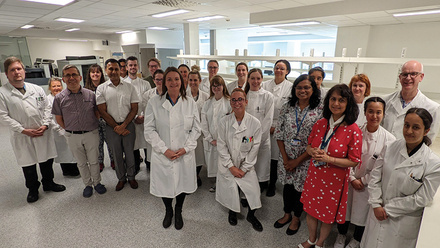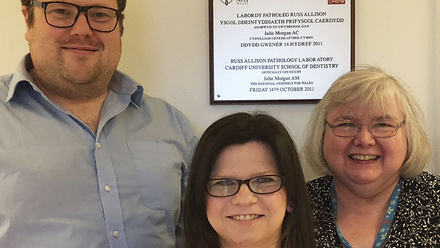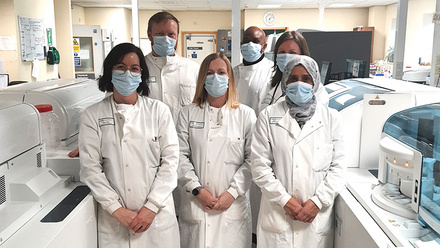Role Requirements and Banding for Scientists undertaking Reporting within Cellular Pathology departments
These evolving scientist roles are increasingly accepted and relied on throughout the UK and demonstrate the value of a flexible scientist workforce as a means of meeting increasing workload demands on histopathology and cytopathology services. The IBMS/RCPath professional qualifications in histopathology and cytopathology support the standardisation of training and practice of scientist reporters.
As an aid to departments wishing to utilise the opportunities offered by scientist reporter roles the IBMS has described in outline the expected job content, the qualifications required for each role and the appropriate Agenda for Change (or equivalent) pay grade.
This guidance does not differentiate between registered biomedical scientists and registered clinical scientists as either registrant may qualify and undertake these reporting roles. As such, the clinical scientist reporting Agenda for Change job profile is appropriate for individuals on either Health and Care Professions Council (HCPC) register.
The Advanced Specialist Diploma in Histopathology Reporting
Enables scientists to demonstrate the scientific and clinical knowledge underpinning the practice of the reporting of simple to highly complex cases of either gastrointestinal tract, gynaecological tract or dermatopathology specimens, and the practical competence required to accurately report all specimens whether benign or malignant within these sample types. It also enables the scientist to represent the department at multidisciplinary team meetings in the relevant specialty.
This qualification recognises the advanced knowledge and skills of highly experienced dissectors and reporters who are competent to handle a range of cases, from simple to the most complex, and who have extensive knowledge of the associated pathologies. The award of this Diploma evidences knowledge and expertise within the field of practice equivalent to that of a medical consultant.
The Advanced Specialist Diploma in Ophthalmic Pathology
Enables scientists to demonstrate the scientific and clinical knowledge underpinning the practice of dissecting and reporting selected ophthalmology pathology samples.
This qualification recognises the advanced knowledge and skills of highly experienced scientists who have extensive knowledge of ophthalmic pathology. The award of this Diploma acknowledges the highest levels of knowledge and expertise within the field of practice.
The Advanced Specialist Diploma in Cervical Cytology
Enables scientists to demonstrate the scientific and clinical knowledge underpinning the practice of cervical cytology and the practical competence required to screen, interpret and report normal and abnormal cervical cytology results and recommend patient management. It also enables the scientist to represent the department at multidisciplinary team meetings and participate in cervical cancer case reviews.
This qualification recognises the advanced knowledge and skills of highly experienced scientists who have extensive knowledge of cervical cytology. The award of this diploma acknowledges the highest levels of knowledge and expertise within the field of practice.
The Advanced Specialist Diploma in Non-Gynaecological Cytology
Enables scientists to demonstrate the scientific and clinical knowledge that underpins the assessment and reporting of negative and malignant exfoliative diagnostic (nongynaecological) cytology specimens; namely, respiratory samples, urinary tract samples and serous effusions. It also enables the scientist to represent the department at multidisciplinary team meetings as well as provide Rapid On-Site Evaluation (ROSE) at fine needle aspiration clinics in order to evaluate adequacy and triage material appropriately. 3 Position Statement on Role Requirements and Banding for Scientists undertaking Reporting within Cellular Pathology departments – February 2021.
This qualification recognises the advanced knowledge and skills of highly experienced scientists who have extensive knowledge of diagnostic cytology. The award of this diploma acknowledges the highest levels of knowledge and expertise within the field of practice.
The Diploma of Expert Practice in Non-Gynaecological Cytology
Provides evidence of the scientific and clinical knowledge that underpins the practice of non-gynaecological cytology and the practical competence required to prepare and report a defined range of negative diagnostic (non-gynaecological) cytology specimens.
The award of this diploma acknowledges expert professional skills and knowledge in diagnostic cytology. The acquisition of this qualification equips scientists with the knowledge and skills required to report a range of benign diagnostic cytology samples, namely respiratory samples, urinary tract samples and serous effusions and consequentially liberate a significant proportion of pathologist time.
Summary of Reporting Roles
Consultant Scientists in Histopathology
Consultant scientists in histopathology reporting are Health and Care Professions Council (HCPC) registered and work at the most senior level within histopathology laboratories, alongside consultant medical histopathologists.
Consultant scientists are able to independently report the entire range of specimens included within their specialty curriculum, including screening samples. The number and range of samples reported is agreed locally according to service need and job planning. They provide teaching to scientists and trainee pathologists and will also represent the department at multidisciplinary team meetings in the relevant specialty.
They must have obtained the IBMS’s Advanced Specialist Diploma (ASD) in Histopathology Reporting and been awarded their Certificate of Completion of Training (CCT) from the Royal College of Pathologists.
The expected Agenda for Change pay band would be a minimum Band 8c (or equivalent).
There may be a local provision for a step-by-step progression within pay banding to correlate with success in the A to D stages of training for the consultant scientist reporting role.
Advanced Clinical Practitioner in Histopathology
Advanced Clinical Practitioners in histopathology are Health and Care Professions Council (HCPC) registered and work at a senior level within histopathology laboratories, under the supervision of consultant medical histopathologists.
They may be studying for the IBMS’s ASD in Histopathology Reporting in either gastrointestinal pathology, gynaecological pathology or dermatopathology. They may also report cases under consultant supervision as part of quality assurance measures.
If working in advanced practice relating to specimen dissection, they must have obtained the IBMS’s Diploma of Expert Practice (DEP) in Histological Dissection.
As expert dissectors, they may hold or be studying for the IBMS’s ASD in Histological Dissection in either lower gastrointestinal pathology, breast pathology or urological pathology.
The expected Agenda for Change pay band would be a minimum band 8a (or equivalent), depending on the current scope of practice (refer to the IBMS position statement on histological dissection roles).
Consultant Scientists in Cervical Cytopathology
Consultants in cervical cytopathology reporting are Health and Care Professions (HCPC) registered and work at the most senior level within cytopathology laboratories, alongside consultant medical cytopathologists. They will represent the department at multidisciplinary team meetings, participate in cervical cancer audits and provide teaching to scientists and trainee pathologists.
They must have obtained the IBMS’s Advanced Specialist Diploma (ASD) in Cervical Cytology. The expected Agenda for Change pay band would be a minimum band 8c (or equivalent).
Cervical Cytopathology Senior Scientist / Manager
Senior scientists and managers in cervical cytopathology reporting are HCPC registered and work at a senior level within cytopathology laboratories, under the supervision of consultant medical cytopathologists.
They may be studying for the IBMS’s ASD in Cervical Cytology. The expected Agenda for Change pay band would be band 7-8b (or equivalent). The exact grade will be determined by 5 Position Statement on Role Requirements and Banding for Scientists undertaking Reporting within Cellular Pathology departments – February 2021 the size of department and complexity of the role in respect of management responsibilities, potentially across more than one site.
Consultant in Diagnostic (Non-Gynaecological) Cytopathology
Consultants in diagnostic cytopathology reporting are Health and Care Professions (HCPC) registered and work at the most senior level within cytopathology laboratories, alongside consultant medical cytopathologists. They will be independently reporting nongynaecological cytopathology samples, represent the department at multidisciplinary team meetings, provide Rapid On Site Evaluation (ROSE) adequacy assessment at a range of fine needle aspiration clinics and deliver teaching to scientists and trainee pathologists.
They must have obtained the IBMS’s Advanced Specialist Diploma (ASD) in NonGynaecological Cytology. The expected Agenda for Change pay band would be a minimum band 8c (or equivalent).
Diagnostic Cytopathology Senior Scientist / Manager
Senior scientists and managers in diagnostic cytopathology reporting are Health and Care Professions (HCPC) registered and work at a senior level within cytopathology laboratories, under the supervision of consultant medical cytopathologists. They may be studying for the Institute’s Advanced Specialist Diploma (ASD) in NonGynaecological Cytology.
They may hold or be studying for the IBMS’s Diploma of Expert Practice (DEP) in Non-Gynaecological Cytology. The expected Agenda for Change pay band would be band 7-8b (or equivalent).
The exact grade will be determined by the size of department and complexity of the role in respect of management responsibilities, potentially across more than one site and also the qualification and associated level of autonomous practice.
Advanced Clinical Practitioner in Ophthalmic Pathology
Advanced Clinical Practitioners in Ophthalmic Pathology reporting are HCPC registered and work at an expert level within their field, alongside consultant medical histopathologists.
They should have obtained the IBMS's Advanced Specialist Diploma (ASD) in Ophthalmic Pathology. The expected Agenda for Change pay band would be minimum 8a (or equivalent).
| Reporting Role | Reporting | Reporting Qualification | Banding (AfC) |
|---|---|---|---|
| Consultant in Histopathology |
Gastrointestinal histopathology Gynaecological histopathology Dermatopathology |
Advanced Specialist Diploma in Histopathology Reporting | Band 8c-8d |
| Advanced Clinical Practitioner in Histopathology |
Gastrointestinal histopathology Gynaecological histopatholog Dermatopathology |
May be studying for Advanced Specialist Diploma in Histopathology Reporting | Band 8a-8b |
| Consultant in Cervical Cytopathology | Cervical cytopathology | Advanced Specialist Diploma in Cervical Cytology | Band 8c-8d |
| Cervical Cytopathology senior scientist / manager | Cervical cytopathology | May be studying for Advanced Specialist Diploma in Cervical Cytology or NonGynaecological Cytology | Band 7-8b |
| Consultant in Diagnostic Cytopathology | Non-gynaecological cytopathology | Advanced Specialist Diploma in Non-Gynaecological Cytology | Band 8c-8d |
| Diagnostic Cytopathology senior scientist / manager | Non-gynaecological cytopathology | May be studying for Advanced Specialist Diploma in Non-Gynaecological Cytology | Band 7-8b |
| Advanced Clinical Practitioner in Ophthalmic Pathology | Ophthalmic histopathology | Advanced Specialist Diploma in Ophthalmic Pathology | Band 8a-8b |
Note: Roles that incorporate both histopathology and cytopathology reporting may be graded above Band 8C.




